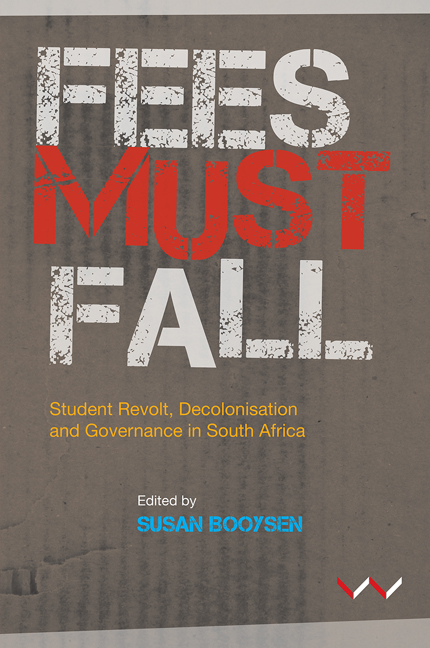Book contents
- Frontmatter
- Contents
- Acknowledgements
- Preface
- Introduction
- PART ONE POWER REDEFINED – ‘WHAT HAPPENED TO GOVERNANCE?’
- Chapter 1 Two weeks in October: Changing governance in South Africa
- PART TWO PRIMARY VOICES – ‘THE ROOTS OF THE REVOLUTION’
- PART THREE THE REVOLT – ‘RISING AGAINST THE LIBERATORS’, SOUTH AFRICA IN AFRICA
- PART FOUR POWER AND CLASS REDEFINED – ‘SIT DOWN AND LISTEN TO US’
- PART FIVE JUSTICE, IDENTITY, FORCE AND RIGHTS – ‘WE CAME FOR THE REFUND’
- APPENDICES
- Contributors
- Index
Chapter 1 - Two weeks in October: Changing governance in South Africa
from PART ONE - POWER REDEFINED – ‘WHAT HAPPENED TO GOVERNANCE?’
Published online by Cambridge University Press: 20 April 2018
- Frontmatter
- Contents
- Acknowledgements
- Preface
- Introduction
- PART ONE POWER REDEFINED – ‘WHAT HAPPENED TO GOVERNANCE?’
- Chapter 1 Two weeks in October: Changing governance in South Africa
- PART TWO PRIMARY VOICES – ‘THE ROOTS OF THE REVOLUTION’
- PART THREE THE REVOLT – ‘RISING AGAINST THE LIBERATORS’, SOUTH AFRICA IN AFRICA
- PART FOUR POWER AND CLASS REDEFINED – ‘SIT DOWN AND LISTEN TO US’
- PART FIVE JUSTICE, IDENTITY, FORCE AND RIGHTS – ‘WE CAME FOR THE REFUND’
- APPENDICES
- Contributors
- Index
Summary
‘The people have more power than the people in power.’
– Protest placard used in student action outside Parliament, October 2015‘You cannot carry out fundamental change without a certain amount of madness … it comes from nonconformity, the courage to turn your back on the old formulas, the courage to invent the future.’
– Thomas Sankara, in interview with journalist Jean-Philippe Rapp, 1985INTRODUCTION
The #FeesMustFall student movement that started in late 2015 unleashed social and political power that challenged the established political order, brought university managements to heel, and changed the social fabric of universities and of parts of society. Foundational values were to be reconsidered, and their ideological bases laid bare and cast off; policies were changed and institutions transformed – and the power of direct action to get radical results was affirmed. October 2015, in the main, changed universities, government's relations with the youth, and government itself.
At the height of the national #FeesMustFall (#FMF) revolt, the protest was taken to the seats of power in Cape Town, Johannesburg and Pretoria. In Parliament, in the African National Congress's Luthuli House and at the seat of government power, the Union Buildings, the political parties and government braced themselves behind closed doors and security fences. In some instances they were shielded by armed security forces, under siege while the revolt unfolded on the streets.
Policy concessions and revisited practices were foremost among the gains – the students extracted significant compromises, substantial compared to what any opposition party, community protest, internal African National Congress (ANC) formation (such as a province or ANC league), or trade union federation had attained on comparable issues in the recent past. The parameter shifts of sociopolitical culture in South Africa were evident, if less tangible than the concessions on educational policy. The students changed the rules of the universities, held government to account and changed both national fiscal planning and higher education praxis. Even more, they served notice that the 1994 settlement was just the opening of the door and not an achievement in own right – that the sociopolitical compact was no longer carved in stone.
- Type
- Chapter
- Information
- Fees Must FallStudent revolt, decolonisation and governance in South Africa, pp. 22 - 52Publisher: Wits University PressPrint publication year: 2016

